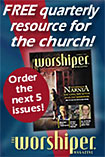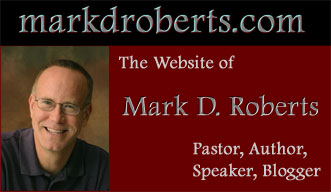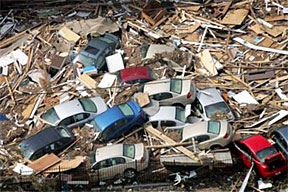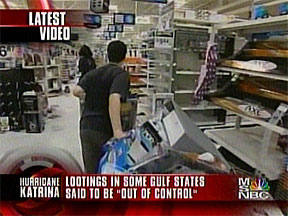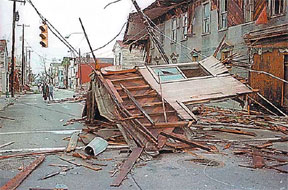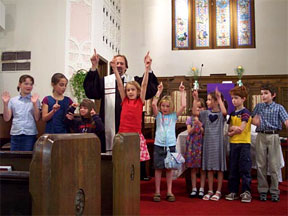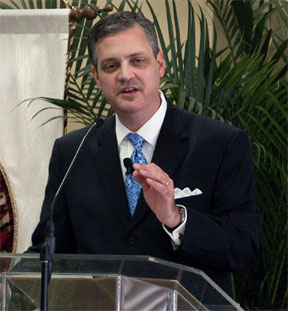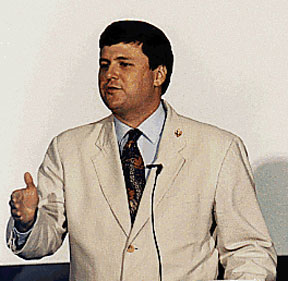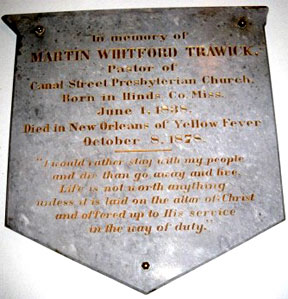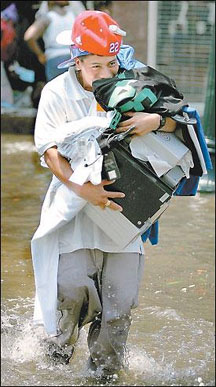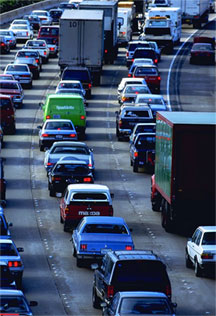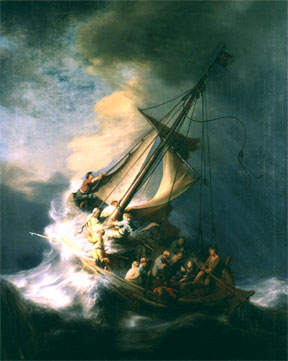| |
A Resource by Mark D. Roberts |
|
In the Aftermath of Hurricane Katrina
by Rev. Dr. Mark D. Roberts
Copyright © 2005 by Mark D. Roberts
Note: You may download this resource at no cost, for personal use or for use in a Christian ministry, as long as you are not publishing it for sale. All I ask is that you give credit where credit is due. For all other uses, please contact me at mark@markdroberts.com . Thank you.
The Brokenness of Nature: A Sad Reminder 
Part 1 of series: In the Aftermath of Hurricane Katrina 
Posted for Thursday, September 1, 2005
In January, in the aftermath of the tsunami in Southeast Asia, I wrote a short blog series in which I reflected theologically on nature and its capriciousness. In All Things New, I explained how God had created the world not only good, but very good. Yet in ways we don't fully understand, human sin led to the brokenness of God's excellent creation. Hence tsunamis. Hence hurricanes. Hence thousands of people killed and millions of lives turned upside down. I went on to show, however, that Christians hope for the eventual renewal of creation when God completes his saving work in this world. Yet, in the meanwhile, we life in the midst of a broken world that's in the process of being restored.
Now the sad reminder of the brokenness of creation has been brought much closer to home. Devastation covers the shores, not of some far away land with unfamiliar names, but of Louisiana and Mississippi. Many of us know people who have been hurt by the hurricane and its aftermath. All of us will be personally touched by this disaster, both in our hearts and in our wallets. And we'll know, once again, that the world is broken. As it says in the New Testament, "the whole creation has been groaning in labor pains until now" (Romans 8:22). We're caught up in this pain as we await the new creation yet to come.
Although pictures of flooded homes, destroyed apartments, piled up cars, and thousands of homeless people make me sad, I must admit that something else produces an even stronger visceral reaction within me, a powerful combination of anger and pain. I'm talking about looting. I'm sure you've heard the stories and seen the pictures. Throughout the devastated Gulf region people have been breaking into unguarded stores and helping themselves to all sorts of merchandise.
Of course in some cases people are stealing things they desperately need to stay alive: water, food, medicine. This sort of action is understandable. Moreover, I fully expect that we'll hear stories down the road of folks who have come back to the stores in order to pay for what they had taken. Good people do this sort of thing, and there are lots of good people in Louisiana and Mississippi. |
|
| |
|
The looting that elicits such a strong reaction is not about a desperate attempt to preserve life. It's an expression of greed and selfishness. It's taking advantage of a tragedy to enrich oneself with meaningless stuff. It's caring so much about oneself that one cannot stop to think about others.
Why do people loot in times of crisis? I'm sure we'll hear from the "experts" in the next few days, explaining looting as a result of poverty and social ostracism. It will end up being the fault of the government, or the businesses that were looted, or the whole society, for that matter. Of course the "experts" won't mention the fact that the vast majority of poor people along the Gulf didn't steal a thing. They'll miss the fact that looting has something to do, not only with the breakdown of community, but also the breakdown of a moral world in which there is recognized right and wrong.
I'm sure that looting can be explained from a number of perspectives. Yet I can't see how we can avoid the obvious. A person who loots is stealing. Putting aside cases of life and death desperation, the looter doesn't have the moral judgment to see that it's wrong. Or, if the looter has the moral judgment, then he or she lacks the moral will to refrain from obviously wrong behavior. Looting speaks of the failure of our society to help people become morally mature human beings.
| Yet this isn't the whole story either. The Bible has plenty to say about right and wrong, and it surely values moral instruction. But Scripture also teaches that human beings are evil on the inside, and are in need, not only of moral instruction, but of profound spiritual transformation. In an ironic passage in Genesis, after God destroyed most of humanity through a giant flood, He said, "I will never again curse the ground because of humankind, for the inclination of the human heart is evil from youth" (Genesis 8:21). Jesus said, "For it is from within, from the human heart, that evil intentions come: fornication, theft, . . ." (Mark 7:21). In other words, looters are simply living "from the heart," as it were. They're doing what comes naturally. This is no excuse, of course. But it is an explanation. |
|
| |
A looter having a free for all in a Wal-Mart in New Orleans. ( MSNBC)
|
Perhaps one of the reasons I'm so bugged by scenes of looting is that, at some level, I relate to the looters. They force me to confront things in human nature – indeed, in my own nature – that I'd rather deny. I can't imagine that I'd ever steal from a Wal-Mart, if, heaven forbid, the city of Irvine was devastated by some natural disaster, like an earthquake. But the greed and selfishness of my heart gets expressed in lots of other ways, ways that are much more subtle. Perhaps they're even more virulent because they're more easily rationalized away.
Let there be no doubt about it. Nature is broken, both the natural world and human nature. We human beings need, not only moral parameters to guide our behavior, but also spiritual transformation so that we might desire to do what's right.
And this is exactly what God provides, both through the revelation of Scripture, and through the work of the Holy Spirit in our hearts. Someday God will mend this broken world. This is our hope. But, in the meanwhile, if we open our hearts to God today, that healing process can begin in us right now. And then we can be agents of God's restoration in the world.
A New Way to Help: High Tech/High Touch Responses to Hurricane Katrina, Section A 
Part 2 of the series: In the Aftermath of Hurricane Katrina 
Posted for Friday, September 2, 2005
| I can still remember watching the television reports of widespread devastation in Charleston, South Carolina. It was September, 1989, and Hurricane Hugo had just plowed through downtown Charleston and several of its suburbs, leaving massive destruction in its wake. I remember wishing that I could do something, but feeling helpless. Other than give a few bucks to the Red Cross, which was surely a good thing, and pray for the people of Charleston, which was also a good thing, how could I make a difference? |
|
| |
A downtown street in Charleston, South Carolina, showing a tiny bit of the devastation caused by Hurricane Hugo in September, 1989 |
I felt a similar sense of powerlessness in the aftermath of September 11, 2001. Given my responsibilities as a father and a pastor, I couldn't very well pick up and go to New York City. So I was left, once again, with contributions and prayers, and with a nagging but unfulfilled desire to help.
I think tens of millions of Americans are feeling more or less the same way when we see the heart-breaking destruction caused by Hurricane Katrina. Most of us can't grab a boat and help folks escape from New Orleans. So we do what we can, mostly from a long distance away, all the while wishing we could somehow do something more.
Now, thanks to the Internet, something more is becoming increasingly possible. Let me share a couple of examples.
Example #1: Daniel Nugent and Openings for Students Affected by Katrina
Daniel Nugent is a junior at the University of Illinois (Champagne/Urbana). That's all I know about him, other than the fact that today he had an idea for how to help university students from the Gulf Coast. Realizing that these students would be missing at least a semester, maybe more, Daniel decided to collect openings in universities for students impacted by Hurricane Katrina. These are posted at his brand new blog: Openings for Students Affected by Katrina. So far, in only a few hours of its existence, this blog has collected several thousand openings at many schools, including: University of Illinois, University of Texas, University of Michigan, Indiana University, University of Alabama, University of Wisconsin, University of Florida, University of South Carolina, University of Kentucky, University of Tennessee, University of Missouri, Illinois State University, Texas A&M, Loyola University (Chicago), University of Colorado, University of Nebraska, Florida Tech, Alabama A&M, Tuskegee University, Emory University, Baylor University, Loyola-Marymount University (Los Angeles), University of Hawaii, Alfred University, Cornell University, and Rice University. And all of this in only four hours of blog life! This is truly extraordinary, and it couldn't happen without the Internet/blogosphere. Kudos to Daniel Nugent (and HT to Hugh Hewitt).
Example #2: Canal Street Presbyterian Church
The second example is a personal one. As I thought about how I could make some difference in the relief and rebuilding efforts, I considered my resources. I am the pastor of a caring church. And I'm a blogger who gets a couple of thousand readers each day. I'm also pretty handy on Internet searches, thanks to Google and quick fingers. It seemed to me that, in addition to making a charitable contribution for short-term relief, I could help my church and my blog readers get meaningfully involved in a long-term relationship with a church in the devastated area.
| So I started surfing around the Internet. Since I'm a Presbyterian, I thought I'd start by looking for a vital Presbyterian congregation along the Gulf Coast. Before long I discovered Canal Street Presbyterian Church. The church website isn't fancy, but it bears witness to a Christ-centered church with a desire to reach the people of New Orleans. The address put the church right square in the middle of the city. The website did not, however, identify the pastor, or provide an obvious way to contact him. So I did some more digging, and found references to "Pastor Mike." |
|
| |
Pastor Mike and kids from the Canal Street Prebyterian Church |
This is where my story gets rather strange. (You can hum the tune from The Twilight Zone now, if you wish. Or click here [.mov file, 84K].) A picture of Pastor Mike on the CSPC website looked strangely familiar. Then, when I found a link for e-mailing him, I noticed that his address began with "m.w.hogg." That's when it struck me. I know a Mike Hogg who is a Presbyterian pastor somewhere in the south. He's a old friend, with whom I'd lost touch in the last few years. That's why the photo looked so familiar.
A little more searching in the CSPC website led me to a phone number in Houston, where Mike was staying with his family. At first it was a vacation; now, of course, it's evacuation. So I called Mike, and so began both a renewed friendship and new ministry partnership. I quickly touched base with the elders of my church, also through the Internet, of course, and they strongly supported the idea of having Irvine Presbyterian Church enter into a relationship with the Canal Street church. At first this means we will be sharing our money and our prayers. In time, I expect we'll be sending teams to participate in the rebuilding of New Orleans.
Both Daniel Nugent's website and my experience with Canal Street Presbyterian Church are great examples of "high tech/high touch" responses to a disaster (to use a phrase coined by John Naisbitt and popularized in his writings, including Megatrends and High Tech/High Touch.) Both examples are completely dependent on technology, especially the Internet. Yet both will lead to very personal and individualized responses to the tragedy on the Gulf Coast.
I believe that this sort of response is crucial, especially when we consider the long-term needs in Louisiana, Mississippi, and other states. Tomorrow I'll explain further what I mean. But if you want an advanced look at some of what I'm thinking, check out the great article by Hugh Hewitt at The Daily Standard. I think Hugh's right on target here.
Words of Wisdom Concerning Hurricane Katrina 
Part 3 of the series: In the Aftermath of Hurrican Katrina 
Posted for Sunday, September 4, 2005
The mouths of the righteous utter wisdom,
and their tongues speak justice.
Psalm 37:30
Yesterday I had the chance to listen to words of wisdom concerning Hurricane Katrina. Hugh Hewitt had invited me and a couple other theologians to join him on his radio show for an hour of conversation. The other guests were Dr. John Mark Reynolds, a philosophy professor at Biola University, and Dr. R. Albert Mohler, Jr., president of The Southern Baptist Theological Seminary. Both of these are brilliant academics who are able to communicate with a wide audience. (They are also bloggers, interestingly enough. I check their sites regularly because they always have insightful things to say.)
In a moment I want to share a few highlights from the conversation on Hugh's show, but first I want to add a couple of observations.
First, both Dr. Reynolds and Dr. Mohler are professors who work mostly in the academic world of teaching and publishing. But, as you'll see in a moment, both of these men are not cloistered in some ivory tower of ideas. They live and think in the real world where real people feel real pain.
Second, time and again throughout the conversation I was impressed by the articulate wisdom of my interlocutors. I felt privileged to be in a conversation with them and to learn from their biblically-inspired wisdom. If you read the transcript of our conversation, you'll notice that I often found myself simply saying "Amen" to what the others had already said.
In fact, what I want to share below are not things I said, but things I heard yesterday. Many thanks to Duane at radioblogger.com for transcribing this conversation. In addition to being a great radio producer for Hugh and a prolific blogger, Duane is also one of the world's finest and fastest transcribers. So, if you're interested in the entire conversation between Hugh, Dr. Mohler, Dr. Reynolds, and me, you can find it at radioblogger.com. I'll simply include a few highlights below (paraphrasing Hugh's questions).
Hugh: How should we respond as Christians to this tragedy?
| Al Mohler: Well, I think the first thing we have to do is to weep with those who weep. And this is not a tragedy that is over. It continues to unfold. And so right now, there are people who do not know where their wives and husbands and children are. They have no idea what their future might be. They have no idea if there's even a home to which they can return. Some of them already know they have lost loved ones, and some of them have not even been recovered, in terms of bodies. So there's an appropriate Christian response to weep with those who weep. And then we have to be there to do what we possibly can do. To feed the hungry and to clothe those who are naked, and to give water, and all these things, by the way, are not just metaphorical needs. These are dramatic, physical needs of the present. And then we as Christians have to be there to speak, not so much on behalf of God like Job's friends, but to speak as Christians. To speak of the hope that is within us, and to speak to those who right now have no hope. |
|
| |
Al Mohler
|
John Mark Reynolds: As people are hurting, the think the most encouraging thing that I can think of is if I was hurting, wondering how my relatives were, was that I have a God who knows pain. And He doesn't just know it as an abstract, philosophical idea, a piece of theology. He came down and experienced intense, real pain. And He's there with those folk in New Orleans and Louisiana and Alabama, Mississippi. He understands what they're going through, and He's there, reaching out to help them.
. . . I also think we have a problem that's unique to our culture. And that is that people are used to information, and even money, changing hands very quickly. We want to give money to the Red Cross. We use our credit card, it goes through in a matter of seconds. But a disaster like this reminds us that real concrete, steel, food, people . . . they don't move so quickly. They move in real space and time. And yet, we're used to being able to solve information problems immediately. Well, in some ways, we're facing a crisis that requires 1950's technology: steel, people, concrete. Fixing very complex, very real world structures. And we're going to have to be patient. We're not going to be able to click a button and do it.
Hugh: What about the problem of suffering in the face of such a crisis?
Al Mohler: Well, I'm thankful that we're not the first to have to think about this. And I'm very, very thankful that God has not left us in the dark about whether He's involved with us. You know, the reality is that we live in a fallen world. And we have to use some vocabulary as Christians that may sound strange to people who are not, that we live in a fallen world, a post-Genesis 3 world, in which awful things happen. Briars grow on trees. The earth reluctantly gives up its harvest. We have tornadoes and hurricanes and earthquakes and tsunamis. And we do understand that we live in a world that sometimes seems hostile. But at the same time, it is a world that is also filled with incredible beauty, and with tremendous joys. And we understand also that this is an opportunity to say look. We all know this isn't the way it's supposed to be. The question is, how can we get back to that? And the fact is, human beings can't reverse the curse. Only God can do that. He does that in Jesus Christ. And so without just seeking to see this as an evangelistic opportunity, we do need to understand that it is an opportunity for Christian truth-telling, to people who desperately need a word of hope. And so it is an act of Christian love to reach out to them and say, "Look, I can tell you that your suffering is not meaningless, and I can tell you that you have not been abandoned, because I know the God who rules the waves, and I know the God who has sought you through Jesus Christ, His Son."
John Mark Reynolds: I think whether you're a believer or a non-believer, you can't solve the problem of evil in the universe by undercutting the existence of goodness. When we see all the people reaching out when the sun comes up in the morning, and we see the goodness of the universe, we don't want to destroy that in our sorrow over the evil that really exists.
Hugh: Does God cause disasters like Hurricane Katrina, or does He simply allow them to happen?
| John Mark Reynolds: Well, it's like this. I'm responsible for what my kids do, because I'm the father of my kids, and I provide supervision for them. But when my kids do something bad, I have a kind of responsibility, but I don't have a direct responsibility. God's a little bit different, because He also sustains the universe. But God is the cause, the first cause of everything. But He isn't the direct cause of evil that occurs in the universe. I'm afraid that we messed up the system. We put grit in the divine watch. And the universe is running badly. So God is not directly to blame, if you want to say that, for the hurricane. He doesn't want people to hurt, and He tried to, and did provide the means to fix the system. And so slowly, like a good surgeon, He's bringing the universe back into order. He's taking the grit out of the machine. And He's doing it with the least possible pain to humanity. But sometimes, it does hurt, because we get in the way of that divine operation. |
|
| |
John Mark Reynolds
|
Al Mohler: How do we explain how God is active in this, because we make two claims at the same time? We claim simultaneously that God is good and God is all-powerful. And an event like this causes us to say well, if God was all-powerful, why did not He prevent it? And you know, I agree with what John Mark Reynolds had to say. It's not as if we can just say we know why this happened. But at the same time, we do know that God has not let the universe just spin out on its own. When I said He was sovereign, the caller asked about that, it means that God exercises an active rule over the universe. And so to some extent, we also have to believe that God is doing something in this that will bring out good. Now that's not to say that the hurricane was good. It's certainly not to say that the tragedy was good. That would be a lie. And it would be an obvious untruth. But you know, in the midst of this, much good is happening, and I think we really have to look at that. And we also, Hugh, have to look at the long haul. We have to take a look and understand that only when God makes all things right . . . we have to believe in the consummation of all things, that God will bring that about. And when God makes all things right, at that point, every tear will be wiped away. And until then, we do live in a world that, at many times, is a veil of tears.
And a closing comment from Al Mohler:
Al Mohler: I think we've learned a lot over the last week, an incredibly painful lesson. Let's not forget what we've learned. We've learned that we are absolutely dependent upon God. We've learned that we are absolutely dependent upon each other. And we've been reminded once again as Christians that we have a job to do. And right now, the most important thing we must do is get busy and get that job done.
Amen to that! Thanks to Drs. Mohler and Reynolds for sharing their wisdom and their compassion with me and with Hugh's audience.
A New Way to Help: High Tech/High Touch Responses to Hurricane Katrina, Section B 
Part 4 of the series: In the Aftermath of Hurricane Katrina 
Posted for Monday, September 5, 2005
In Section A of this blog post, I told a couple of stories about how the Internet is facilitating relationships that will help care for victims of Hurricane Katrina and, in time, contribute to the rebuilding of the Gulf Coast. This exemplifies the combination of "high tech" and "high touch" that has been popularized in business, and will now be central to such things as disaster assistance.
How strange that such an impersonal medium, the Internet, can foster such personal relationships! As I explained in Section A, the combination of Google, a church website, a discussion board, and e-mail allowed me to make personal contact with an old friend who is pastoring a church that is right in the middle of New Orleans (though his real church, the people, are now spread throughout the U.S.).
The Internet is also helping members of the Canal Street Presbyterian Church connect with each other while they are in what Pastor Mike calls their "diaspora" (the Greek word for "dispersion"). The church discussion board allows members, most of whom would not know how to call each other on the phone right now, to post there whereabouts and their temporary phone numbers. They've been able to check up on each other and to make sure everybody is okay. (As of this moment, a few of the members of the Canal Street church are unaccounted for. Please pray for these folk.) Also, the Internet is helping church members to organize small groups for mutual support and prayer, even though these groups are meeting in cities hundreds of miles away from their home base in New Orleans. Talk about "high tech/high touch"!
We don't need the Internet to get financial immediate financial assistance to the Gulf Coast. Donations to organizations such as Feed the Children or Presbyterian Disaster Assistance can happen by check, as they have done for decades (though online credit card or Paypal gifts can speed up the benevolent process a bit). Emergency relief is, of course, the crucial need of the moment. With hundreds of thousands of people displaced and homeless, money is needed for the basics of life (food, water, shelter, etc.). |
|
| |
Canal Street Presbyterian Church has a long history, having been founded in 1847. A bit of the church history can be found here. The plaque pictured above is found in the Canal Street church, and commemorates one of the church pastors who died in 1878 of yellow fever. Ironically, this disease was spread by mosquitoes who thrived in the swamp-like environment of New Orleans which had no adequate sewage system or waterworks. Pastor Trawick lost his life because of his commitment to minister to the people of New Orleans even in the midst of a terrible epidemic. |
But after the floodwaters subside, and after the refugees have been settled for the moment, there will begin a rebuilding effort of Herculean proportions. The destruction in places like Gulfport or Biloxi, which looks eerily like it was caused by a tsunami, will require massive construction efforts. And, as of this writing, it's hard to know what will be needed in New Orleans. I expect the scope of the need in that city will make the overwhelming requirements of Gulfport and Biloxi look like small change.
How will the rebuilding of the Gulf Coast happen? How will it be funded? Who will do the work? Obviously, government will play a central role in this effort. With the Federal Government taking the lead, state and local authorities will be crucial to the funding of the rebuilding effort. This is both fine and necessary.
But so much more will be necessary. If we sit around and wait for government to solve our problems, we'll be sitting for a long time. Ultimately we'll be frustrated, full of complaints and accusations. You see, I believe the reconstruction of the Gulf Coast – not just the buildings, but the life of that region – will require a substantial investment by the people and institutions of this whole country, far beyond the government.
Yet what can somebody in Seattle, Washington, or Augusta, Maine, or Irvine, California do to be a part of the rebuilding of the Gulf Coast? Yes, we can give money to helping organizations. But this sort of charity tends to run out in time. It's hard for us to care about things on such a large scale. This is where, I believe, a "high tech/high touch" solution can make a huge difference.
Hugh Hewitt's recent article for The Daily Standard hits the nail on the head, I think. In "Rebuilding the Gulf Coast, One Group at a Time," Hugh argues that groups throughout our nation should partner with like groups in the devastated region: churches with churches, community theatre groups with community theatre groups, PTAs with PTAs, and so on.
Why are these sorts of partnerships so crucial? Well, for one thing, similar groups will understand the particular needs and dynamics of similar groups. I have a pretty good idea what churches need. I have very little idea what garden clubs need. So if my church and I get involved with another church, we're already on the same wavelength.
But, even more importantly than this, the kind of partnerships Hugh describes will foster deep and lasting friendships. And these, in turn, will foster long term care. And this is absolutely essential to the rebuilding of the Gulf Coast. Current efforts are focused on meeting immediate needs for food, water, shelter, etc., and rightly so. But in time the focus will shift to the much larger and longer term need for rebuilding. Only sustained relationships between individuals and groups will last over the long haul.
For example, I mentioned in my last post on this topic that my church was entering into a partnership with the Canal Street Presbyterian Church of New Orleans. At the moment this is pretty much a one way street, with my congregation offering prayers and taking up a special offering for the Canal Street church.
But, even now, we've been touched by our relationship with this church. Yesterday morning I received an e-mail from Canal Street's pastor, Mike Hogg. Pastor Mike described for me a meeting of some of his church members who have been evacuated to Houston. It was a touching description, honest in sharing both pain and hope. As I read this note, my heart was moved in a way it had not been before. I felt deeper empathy, and that empathy makes me both more human and more generous. I shared portions of this e-mail with my congregation today in worship services, and they were also impacted. We're just beginning to connect our hearts to the hearts of the Canal Street folks.
I strongly recommend to other churches and organizations that they consider making similar partnerships. Here the Internet can be very helpful. "High tech" will help to produce "high touch" relationships. And these relationships will make all the difference in the world for a long time to come.
If you'd like to participate in one "high tech" response to the hurricane that will lead to "high touch" activity, I'd encourage you to make a contribution to the Canal Street Presbyterian Church. You can do it the old fashioned way by sending a check through snail mail (to a new address outside of New Orleans). Or, you can make a contribution by way of Paypal. Two or three clicks and your money can soon be in the hands of people who will use it well and wisely to bring relief to those impacted by Hurricane Katrina.
Am I As Bad as the Looters? 
Part 5 of the series: In the Aftermath of Hurricane Katrina 
Posted for Friday, September 2, 2005
In last Thursday's post I expressed my outrage over the looting that has been going on in cities ravaged by hurricane Katrina. The fact that some people take advantage of a catastrophe like this doubles the tragedy. It shows us the brokenness, not only of the natural world in general, but of human nature as well.
I also suggested that, at some level, I relate to the looters, and that's part of what bugs me about them. I explained, "They force me to confront things in human nature – indeed, in my own nature – that I'd rather deny."
This perspective has been distressing to some of my blog readers. They have shared my indignation over the looting, but not my confession that, in some ways, I am like the looters. So I thought I'd add a few additional words of explanation about what I mean and do not mean. (Thanks, as always, to the readers of my blog who take time to communicate with me. Your kinds words encourage me and your constructive criticisms help me to think and write more truly.)
1. It's right to feel moral outrage over the looting along the Gulf Coast.
In a day when we're exposed to so much violence and social decay, when it's "in" to be cynical and blasé about such things, when we're apt to explain away evil as the result of victimization and social failures, and when media saturation deadens our moral instincts, I'm glad that so many people feel moral outrage when they see scenes of looting. This suggests that we, as a society, haven't completely lost touch with our conscience. Heaven help us if we come to the point where we say, "Oh well, people always loot after natural disasters. Ho hum!"
2. There's a danger, however, in focusing so much on the sin of others that we overlook or minimize our own sin.
In general, we humans tend to minimize our own wrongdoing. Sometimes we do this by rationalizing it. Sometimes we do this by blaming others. Sometimes we do this by accentuating the sins of others so that we come out looking pretty good by comparison. This last case is the one that can catch us as we become angry over video clips of looting along the Gulf Coast. |
|
| |
The young man is sloshing along Canal Street in New Orleans with his loot. (KHAMPHA BOUAPHANH/Knight Ridder Tribune)
|
"But," you say, "I haven't looted. I haven't stolen anything from anyone." Good, that's the way it should be. But, before you become too self-satisfied, you might ask yourself: "Have I ever copied software onto my computer that I didn't purchase? Have I ever taken possession of tapes, CDs, or MP3s of copyrighted music for which I had no intention of paying? Have I ever intentionally understated my income on my tax returns? Have I ever "borrowed" supplies from work without giving them back?" If you can answer "yes" to any of these questions, then you have stolen. Your actions weren't caught on video and played for the world, of course. But, morally speaking, robbery is robbery. Are you really so innocent? Am I?
Even if you can answer "no" to all of the questions above, and I know many people who truly don't steal, you might find other kinds of sin more to your liking. Like pride, perhaps. Or judgmentalism. Or a lack of compassion for the poor. Or . . . you name it. Would you really want the contents of your heart displayed on the six o'clock news? I know I wouldn't.
3. Owning the sin in my own heart does not excuse or minimize the wrongness of sin in others.
Some of my readers were concerned that by acknowledging ways in which I am like the looters I was thereby exonerating them. I'll admit that some of the public comments about looting went down this predictable path. But I'm not following along. I hate the sin in my own heart and actions. It's wrong. It's evil. And the same is true for the sin of others. Those who looted – bracketing for a moment those who took food, water, or needed medical supplies – did wrong. Period. The fact that I see a "looter" in myself doesn't excuse anything.
I sometimes hear good Christian folk argue the other side. When confronted by wrongdoing in others, they'll say, "Well, we all have our issues, our failures. So who am I to judge others?" Here's my answer: We don't judge others as if we ourselves were exempt from judgment ourselves. Rather, we apply God's standards to human behavior and human hearts, and discover that we all come up short. When the Bible says "All have sinned and fall short of the glory of God" (Romans 3:23), it doesn't conclude, "So just fagedaboutit!" Rather, it says, "Yet now God in his gracious kindness declares us not guilty. He has done this through Christ Jesus, who has freed us by taking away our sins" (Romans 3:24, NLT). Therefore . . . .
4. Seeing my own sin, as well as the sins of others, brings me once again to remember the grace and mercy of God, and to live my life as a bestower of grace and mercy to others.
When I see folks looting on television, I can truly say, "There but for the grace of God go I." Thus I'm once again grateful for the ways God has mercifully forgiven my sin through Christ and graciously helped me to grow into His image. Moreover, the reminder of God's grace and mercy urges me to share the same with others. Not to do so is to dishonor God's grace in my life (see Matthew 18:23-35).
Let me reiterate that God's grace does not excuse our sin. It doesn't explain it away as a result of social or economic pressures. So when I speak of extending grace to people, even to people walking down the street with television sets stolen from Walmart, I'm not saying we should ignore or minimize their wrongdoing. Rather, I mean we should not think of them as if we were, by nature, their moral superiors. And I mean that we should pray that God will use what's happening in their lives to bring them to a transforming experience of his mercy. And I mean that I need to commit myself once again to the growth of true justice and righteousness in our society, so that fewer people will be poor, and all people will more ethical in their behavior.
As someone who doesn't live anywhere near the Gulf Coast, I can't directly do much for this region. That's why I've joined into a partnership with a wonderful church in New Orleans, the Canal Street Presbyterian Church. This congregation upholds God's righteousness and God's mercy. Even in the face of great tragedy, they'll continue to work for the moral, spiritual, and social betterment of their neighbors. Thus, through my prayers, my financial gifts, and, I hope in time, my visits, I can actually help this church bestow God's grace and mercy upon the hurting people of New Orleans.
Speaking of looting, as I've listened to "experts" talking about the looting along the Gulf Coast, something I've heard again and again has incensed me. Tomorrow I'll blog about this.
Looting and Poverty: Is There a Connection? 
Part 6 of the series: In the Aftermath of Hurricane Katrina 
Posted for Wednesday, September 7, 2005
Why Do People Loot?
The pictures of mass looting along the Gulf Coast in the aftermath of Hurricane Katrina have been deeply distressing. We like to think of our society as more civilized and more moral than recent video footage has shown it to be. And so we wonder, "Why do people loot?" and "Is there anything we can do to prevent this sort of lawlessness in the future?"
Looting isn't new, of course. It often happens when legal authorities are, for some reason, removed from the scene, or greatly outnumbered by unruly crowds. It happens in the context of riots, political revolutions, and sports championships. It happens when a few people brazenly break the law, and others, like mythical lemmings, follow them as they jump off the cliff of social decency.
I've seen this sort of social behavior in other contexts. One time I was stuck in a terrible traffic jam on a freeway in Orange County, California. For what seemed like forever we just weren't moving. We were all feeling frustrated and anxious, I'm sure. All of a sudden, one car broke out of the crowd and started driving along the shoulder of the freeway – something clearly illegal and unsafe. Then another car joined the first. Pretty soon a stream of cars followed suit. The fragile fabric of social order was torn asunder by a mysterious esprit de corps of lawlessness. |
|
| |
Traffic jam on a Southern California freeway. Sigh! |
I've often thought about that experience and wondered why so many otherwise law-abiding people broke the law so blatantly. I'm sure frustration had something to do with it. And I suppose the lack of visible authority helped. If a police car had been sitting along the freeway, I doubt many would have driven on the shoulder. But, beyond this, I think our fallen minds are wired to rationalize behavior we know to be wrong. If somebody else is doing it, then must not be so bad. Moreover, I think that when we see people getting ahead of us, whether in a line of traffic or in having more material possessions, our sense of entitlement clicks in: "If they can have that, then I can too."
Does Poverty Cause Looting?
When it comes to the looting along the Gulf Coast, however, "experts" have been almost unanimous in pointing to a basic root cause: poverty. For example, in an article entitled "How Looters Are Made," a sociologist explains:
There are huge divisions by race and class in New Orleans, and everyone who lives there knows it . . . . The truth is that people living in the Garden District got out, and those in the Ninth Ward and other poor neighborhoods didn't, and now this combination of rage and poverty is bubbling to the surface.
In an editorial about the looting in New Orleans, USA Today opined that "lawlessness is the inevitable companion of mass poverty, and a threat to civil order should have been anticipated."
I'm sure that poverty contributed to the looting along the Gulf Coast. Looters would have been less likely to steal plasma screen televisions if they had already purchased them for their homes. Moreover, I believe that the extraordinarily high poverty levels in New Orleans added to the intensity of the looting in that city.
But I find many of the comments by pundits to be insulting, not to me personally, but to the vast majority of the poor people along the Gulf Coast who did not loot. I wouldn't be surprised if the actual percentage of looters among the poor in those regions was around 1%. But even if it were as high as 10%, which I doubt, this would still mean that the 90% of the poor did not loot.
So, when some expert speaks as if poverty leads people to loot, this seems both demeaning to the poor and empirically wrong. At most one could claim that poverty, combined with other crucial factors, leads to looting. But these other factors are the real key.
Among these other factors, I expect we'd find a lack of moral understanding, will, and community. People who believe strongly that stealing is wrong, and who tend to act according to their moral convictions, and who are supported by a community of like-minded people, do not loot, even when others are doing it and getting away with it. The widespread looting along the Gulf Coast speaks at least as strongly of a lack of ethical instruction and supportive community as it does about poverty. But, once again, remember that the vast majority of the people there did not loot. I'm not saying this whole area is morally bankrupt, but only that those who looted lack the moral grounding to refrain from stealing even when they had the opportunity to get away with it.
For me, the question of why people loot is an interesting one. But even more fascinating and, in my opinion, significant, is the question of why people do not loot when they have the chance, and when they have plenty of motivation to do so (poverty, opportunity, lack of accountability, etc.). Why did the vast majority of poor people in New Orleans refrain from stealing when they could have gotten away with it? I'd like to see some sociologists work on this question. My guess is that they'd find a combination of moral conviction and morally-based community (including family). But there may well be more.
Poverty is a Real Problem
Now, having said that I think poverty is greatly over-rated as a primary cause of looting, I must add that the tragedy along the Gulf, and especially in New Orleans, has indeed shown the extent to which poverty is still a huge problem in the United States. By downplaying the causal relationship between poverty and looting, I'm not downplaying the embarrassingly high level of poverty in America. Just last month the U.S. Census Bureau released its latest report on "Income, Earnings, and Poverty From the 2004 American Community Survey." (To locate and download this report, click here.) The Census Bureau found that 13.1% of all Americans are living in poverty, up from 12.7% the previous year. The situation in New Orleans is far worse, with the poverty rate more than twice that of the whole country.
Now I realize that these statistics can be political grenades, and that numbers can be twisted for political purposes, and so forth and so on. Right now I'm not in the least interested in trying to figure out who's to blame for the high level of poverty in our nation, and in New Orleans in particular. All I want to say at this moment is that, whatever the causes, there are way too many poor people in our country, and way, way too many in New Orleans. If folks on all sides of the political debate could stop for one moment and simply agree that poverty is a huge problem in the United States, and its something we need to solve with a wide variety of methodologies, this would be a major step forward in trying to solve it.
Hurricane Katrina has dealt a terrible blow to the Gulf Coast. But, if one of the results of this horrendous catastrophe is a deeper awareness of the problem of poverty in America and a new commitment to using our national resources to solve this problem, then the long term impact of Katrina could be far more positive than it now appears.
Did God Send Hurricane Katrina as an Act of Judgment? Section A 
Part 7 of the series: In the Aftermath of Hurricane Katrina 
Posted for Thursday, September 78, 2005
As I mentioned in last Sunday's post, on Friday of last week I spent an hour as a guest on Hugh Hewitt's radio program. Hugh was emceeing a four-way conversation between himself, me, Dr. John Mark Reynolds, a philosophy professor at Biola University, and Dr. R. Albert Mohler, Jr., president of The Southern Baptist Theological Seminary. The transcript of this discussion is available at radioblogger.com.
About half way through this conversation we dealt with the question of whether God caused Hurricane Katrina. The three guests all agreed that God is ultimately sovereign over all things, including the weather, but that it would be wrong to say God sent the hurricane in some direct way. John Mark Reynolds used the analogy of his responsibility as a father. In an ultimate sense he is responsible for the behavior of his children. But this doesn't mean he is the direct cause of everything they do. Here's the full quote by Dr. Reynolds:
I'm responsible for what my kids do, because I'm the father of my kids, and I provide supervision for them. But when my kids do something bad, I have a kind of responsibility, but I don't have a direct responsibility. God's a little bit different, because He also sustains the universe. But God is the cause, the first cause of everything. But He isn't the direct cause of evil that occurs in the universe. I'm afraid that we messed up the system. We put grit in the divine watch. And the universe is running badly. So God is not directly to blame, if you want to say that, for the hurricane. He doesn't want people to hurt, and He tried to, and did provide the means to fix the system. And so slowly, like a good surgeon, He's bringing the universe back into order. He's taking the grit out of the machine. And He's doing it with the least possible pain to humanity. But sometimes, it does hurt, because we get in the way of that divine operation.
I received e-mail correspondence from some people who were not happy with the consensus between Drs. Reynolds, Mohler, and me. They felt as if we had wimped out on the tough question. For them, God's sovereignty means that God did indeed send Hurricane Katrina for His purposes. One person went so far as to reveal what these purposes entailed. They had to do with God's judgment on the city of New Orleans for its long history of immoral behavior.
So, then, should we believe that God sent the hurricane as an act of judgment? Is this the most credible biblical perspective? Let me offer several observations by way of response.
1. God certainly could have sent the hurricane as an act of judgment, or for any other divine purpose.
The God of the Bible has power over the wind and waves. There's no question about it. Moreover, this God can use natural events to influence human behavior or to judge human sin. Just remember the plagues of Exodus or the destruction of the Egyptian army in the Red Sea. Then of course there is the flood in the time of Noah. So there's no doubt, from a biblical perspective, that God has the power to send storms and floods, and that God has done this in the past to execute His judgment.
2. Yet the fact that God could have sent Hurricane Katrina does not mean that He did.
What God is able to do and what God has done are two different things. I think this is where some well-meaning Christians get confused. They rightly believe in God's power over all things, but wrongly conclude that God is directly responsible for all things, including Hurricane Katrina. (In point of fact, most people pick and choose which events they attribute to God and which are merely natural.)
3. There is ample evidence in Scripture for the view that not all natural events are directly caused by God.
Many biblical accounts of storms do not mention God as the author of the tempest. In Mark 4:35-41 Jesus and His disciples are caught in a great storm on the Sea of Galilee. The text speaks as if this were a natural phenomenon. Similarly, in Acts 27 a storm endangers a ship on which the Apostle Paul is a passenger. Though he has prophetic insight into the storm's meaning and future, he never suggests God has caused the storm. Now one could surely argue that God sent both of these storms, and that the Bible just doesn't say this. That's fine. My point is that the Bible doesn't say this, and this is significant. It God were the direct cause behind these storms, you'd think this fact would have made it into the text of Scripture. Moreover, there are times when the Bible seems to regard natural events as natural events, not God-caused events. See point #4. |
|
| |
Rembrandt, The Storm on the Sea of Galilee, 1633 |
4. There is evidence in Scripture that negative natural events are not necessarily caused by God as judgment on sin.
Consider this passage from the Gospel of Luke:
At that very time there were some present who told [Jesus] about the Galileans whose blood Pilate had mingled with their sacrifices. He asked them, “Do you think that because these Galileans suffered in this way they were worse sinners than all other Galileans? No, I tell you; but unless you repent, you will all perish as they did. Or those eighteen who were killed when the tower of Siloam fell on them—do you think that they were worse offenders than all the others living in Jerusalem? No, I tell you; but unless you repent, you will all perish just as they did.” (Luke 13:1-5)
It was common for people in Jesus's day to think of negative events as judgment from God. So if some Galileans were killed by Pilate when they went to Jerusalem to offer sacrifices, it must be because they were particularly bad sinners. Or if eighteen people were killed when a tower fell on them, they must have deserved it. (This way of thinking, by the way, is exactly what Job's friends argued, and God definitively rejected. See Job 42:7-9.) But Jesus rejects these explanations as erroneous. One simply cannot make a one-for-one equation of bad circumstances and bad sins.
Similarly, in John 9 Jesus encounters a man who was born blind. His disciples ask Jesus, "Rabbi, who sinned, this man or his parents, that he was born blind?" (John 9:1). They are assuming that the negative natural event, being born blind, is a direct result of somebody's sin. But Jesus responds, "Neither this man nor his parents sinned; he was born blind so that God’s works might be revealed in him" (John 9:3). So there is no direct correlation between the man's blindness and someone's sin, either his sin or his parents' sin, according to Jesus. (HT to Ben Witherington for noting these examples in his blog. I recommend his post highly, and also the discussion it has engendered.)
"But," one might object, "isn't God sovereign over the actions of governors, and over the falling of towers, and over the state of one's eyes at birth?" I'm tempted to say, "Take it up with Jesus." But, more seriously, God's ultimate sovereignty over creation doesn't mean that He is directly responsible for every natural event. Furthermore, even if one were to press the point of God's being behind all events, there's no way to argue that they express God's judgment concerning specific sins. Jesus rejects this position quite clearly.
Tomorrow I'll finish up my answer to the question "Did God send Hurricane Katrina as an act of judgment?" Stay tuned.
Did God Send Hurricane Katrina as an Act of Judgment? Section B 
Part 8 of the series: In the Aftermath of Hurricane Katrina 
Posted for Friday, September 9, 2005
Yesterday I began to wrestle with the question: "Did God send Hurricane Katrina as an act of judgment?" My main points in yesterday's post were:
1. God certainly could have sent the hurricane as an act of judgment, or for any other divine purpose.
2. Yet the fact that God could have sent Hurricane Katrina does not mean that He did.
3. There is ample evidence in Scripture for the view that not all natural events are directly caused by God.
4. There is evidence in Scripture that negative natural events are not necessarily caused by God as judgment on sin.
Today I want to add two additional observations.
5. The one who argues that God sent Hurricane Katrina as an act of judgment opens up a Pandora's box of theological problems.
Among these problems would be the problem of imprecise communication. If God were using natural events to communicate His judgment, one would assume that the meaning of His judgment would be fairly obvious (i.e. Noah's flood, the destruction of the Egyptian army in the Red Sea, the storm that almost sunk Jonah's boat, etc.). In Scripture, God's active judgment goes hand-in-hand with, and usually following, God's prophetic explanation of the meaning of His action. But this is surely not the case with Hurricane Katrina, at least as far as I'm aware.
In fact, among those who are convinced that Hurricane Katrina is an act of divine judgment, there's no consensus about exactly what God was judging. In a recent post on his blog, Al Mohler summarized the views of three Christian leaders who were certain they knew why God sent Katrina. One man claimed that God was judging New Orleans "for the sin of shedding innocent blood through abortion." Another man related the fact that residents of New Orleans are being forced from their homes to the removal of Israelis from their homes in Gaza. According to this view, God has removed His hand of protection from America because of its complicity in the removal of Israelis from Gaza. Another Christian leader explained the hurricane as God's way to judge New Orleans for its sexual decadence, especially in promoting homosexuality.
The problem is that God hasn't told us any of this. So if Hurricane Katrina were an act of divine judgment, it has failed to communicate its message. More to the point, God has failed to communicate His message, because even those who believe He has sent a message can't agree on its content. This sort of imprecision seems inconsistent with the God who speaks and acts with clarity.
Another problem with the view that God sent Katrina is what I'd call the problem of imprecise punishment. If you listen to the Christians who are sure God sent the hurricane, you'd think that the damage was limited to New Orleans, or, better yet, to particularly sinful portions of New Orleans. But in fact a vast section of the Gulf Coast was devastated by the hurricane. So if you believe that God sent Katrina to punish New Orleans, then you've got to believe that the Almighty isn't a very good shot. You'll recall, of course, that the eye of the storm actually ended up missing New Orleans in favor of Biloxi and Gulfport. This makes God's effort to punish New Orleans look, well, rather sloppy. If I were disciplining my son and accidentally disciplined my daughter as well, and with great harshness, you'd think of me as a pretty lousy discipliner, not to mention a pretty lousy father. Frankly, I think God can do much better when it comes to judgment.
And, even if New Orleans alone had been damaged by Katrina, you'd still have to deal with the "God missed the target" problem. The French Quarter, arguably the home most notorious sin in New Orleans, was one of the least harmed sections of the city, while New Orleans Baptist Seminary was severely harmed, with most of the campus under ten or fifteen feet of water. The god who supposedly sent Hurricane Katrina ends up looking both capricious and ineffective, rather than sovereign. He missed his primary target and ended up pummeling a godly institution instead.
Yet God's imprecision is even worse than this, if, indeed, He sent the hurricane to punish New Orleans. Consider, for example, the terrible devastation of churches along the Gulf Coast. Rick Warren, author of The Purpose Driven Life, reports that the hurricane destroyed the buildings of more than 300 congregations that had utilized the "Forty Days of Purpose" ministry. The total number of devastated churches along the Gulf Coast will be much larger, I'm sure.
There are many more theological problems with the idea that God sent Katrina as an act of judgment. These get into the very nature of God, who is both just and merciful. Given the massive damage caused by the hurricane, and the fact that God didn't send any clear advance warning that it was coming, along with a call to repentance, it's hard to imagine how this action would be either just or merciful. So, those who believe that God sent Katrina as judgment on specific regional sins have a huge, multi-faceted theological problem on their hands. |
|
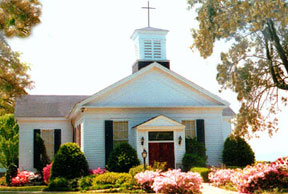 |
Above and below: St. Mark's Episcopal Church in Gulfport, Mississippi, before and after Hurricane Katrina. (Picture below: AP Photo/John Bazemore) |
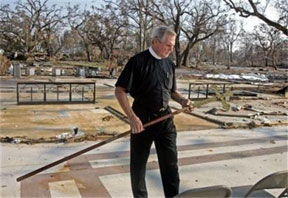 |
|
 |
|
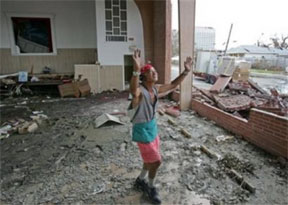 |
|
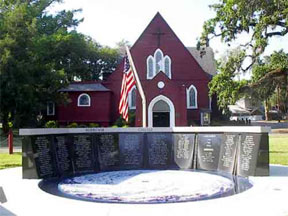 |
Above and below: Episcopal Church of the Redeemer, Biloxi, Mississippi. Ironically, in front of the church in the picture above is a memorial to the victims of Hurricane Camille. (Picture below: Kevin Fujii/Houston Chronicle) |
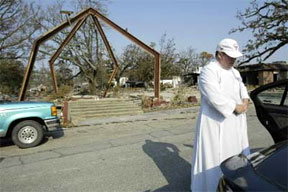 |
Now let me hasten to say that God is sovereign, and His ways are often not our ways. So, even as I do not believe that God sent Hurricane Katrina as an act of judgment, I also recognize the possibility that I am wrong. (Frankly, though, I'd rather be wrong about saying God didn't send Katrina than be wrong about saying that He did. I'd hate to accuse God of being responsible for the deaths of thousands of innocent people when, in fact, He wasn't.)
6. God will use the tragedy of Hurricane Katrina for His gracious purposes.
The good news for the victims of the hurricane, and, indeed, for all of us, is that God transforms evil into good, tears into laughter, tragedy into victory. God uses the sad and painful events of life to further His gracious purposes in our world and in our lives. Remember Jesus's response to the disciples' question about the man born blind. Whereas they surmised that his blindness was a direct result of somebody's sin, Jesus explained, "Neither this man nor his parents sinned; he was born blind so that God’s works might be revealed in him" (John 9:3). Through the blindness of this man God would show His works and reveal His glory.
At this point we can only begin to imagine some of the ways God will use Katrina for His purposes. Allow me to speculate for a moment on what some of these might be:
• God will be glorified in the aftermath of Katrina if churches from throughout the country unite with churches along the Gulf Coast in a massive church rebuilding effort.
• God will be glorified in the aftermath of Katrina if churches from throughout the country unite with churches along the Gulf Coast to bring help, healing, and hope to the local residents.
• God will be glorified in the aftermath of Katrina if Christians from all over the world offer prayers, gifts, and tangible acts of love to those whose lives have been devastated by the hurricane.
• God will be glorified in the aftermath of Katrina if Christians in America resolve to confront the problems of poverty and racism with new fervor and faithfulness. (I'm not proposing that racism explains the slow response of government authorities to the victims of Katrina. But the response of many people in America to the slow response of government authorities surely testifies to the nagging problem of racism in our country, no matter how you look at it.)
• God will be glorified in the aftermath of Katrina if Christians in America embrace more fully the kingdom-centered ministry of Jesus. Sometimes we Christians have focused so much on matters of eternal salvation that we have neglected the this-worldly dimensions of Christian disciple. The wholistic, kingdom-centered ministry of Jesus is summarized beautifully in the prophecy of Isaiah that was fulfilled in Jesus. I'll close with this text, since it suggests what kind of ministry we Christians might have among the people who mourn because their lives have been devastated by Hurricane Katrina:
The spirit of the Lord GOD is upon me,
because the LORD has anointed me;
he has sent me to bring good news to the oppressed,
to bind up the brokenhearted,
to proclaim liberty to the captives,
and release to the prisoners;
to proclaim the year of the LORD’S favor,
and the day of vengeance of our God;
to comfort all who mourn;
to provide for those who mourn in Zion—
to give them a garland instead of ashes,
the oil of gladness instead of mourning,
the mantle of praise instead of a faint spirit.
They will be called oaks of righteousness,
the planting of the LORD, to display his glory.
They shall build up the ancient ruins,
they shall raise up the former devastations;
they shall repair the ruined cities,
the devastations of many generations. (Isaiah 61:1-4)
Home
|


